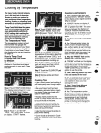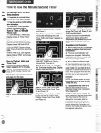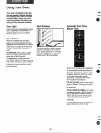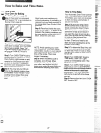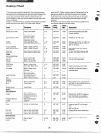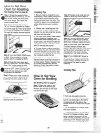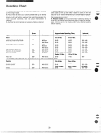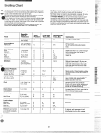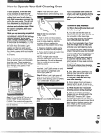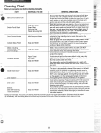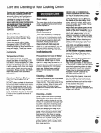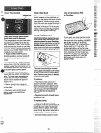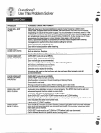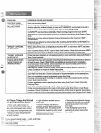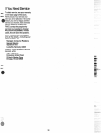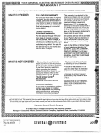
o
Proper awe and cleaning are irnfxw-
tad so ytxlr Ch3khlg centerMM
giveyou effkknt and satisfactory
service.RMow thesedirections
carefuilyin earingfor it to help
assuresafeandpropermaintenance.
BESURE ELECTRIC POWERIs
OFF 13EF0RECLEANING ANY
PARTOF YOURCOOKING
CENTER
RW
Don’t use sharp-edged utensils
around the control panels. They
might damage it.
Clean the panels with a lightly
dampened cloth. DO NOT USE
cleaning sprays or large amounts of
soap and water. These can cause
problems with the control
mechanisms.
Probe
The probe is sturdy, but care
should be taken in handling it. Do
not twist it. Avoid dropping it. Clean
as soon as possible after use.Wipe
it with a sudsy cloth,
then rub metal
parts with a plastic scouring pad if
necessary. Rinse and dry. DO NOT
wash the probe in an automatic
dishwasher.
Foill on
why you l!!ilseit
DO NOT place a sheet of aluminum
foii on any shelf in either your micro-
wave or conventional oven. If you
do, your foods may not cook prop-
erly. The oven finish may be dam-
aged-.And there may be an increase
in heat on the outside surfaces of
the oven.
The oven lamp bulb is long-lasting.
Only a qualified service technician
should replace it.
ENJn””
Your shelf accessory is designed
for use in a microwave oven only;
do not use in a conventional oven.
Do not use a browning dish with
the shelf. Arcing could occur.
Clean shelf with mild soap and
water or in the dishwasher. Do not
remove plastic spacersfrom the
shelf when cleaning. Do not clean
in self-cleaningoven.
for use of
Use metal only as directed in the
Cookbook. Metal trays no more
than 3/4” deep may be used for TV
dinners, and the metal temperature
probe is designed for microwave
oven use. Always keep metal at
least one inch away from sides
of oven.
Clean the outside of your microwave
oven with soap and water, then
rinse and dry. The outer pane of the
window is glass. Wipe it clean with
a damp towel. Chrome is best
wiped with a damp cloth and then
with a dry towel.
Keep it cleanand swee#-smelling.
Opening the oven door a few m[n-
utes after cooking helps air out the
inside. An occasional thorough wip-
ing with a solution of baking soda
and water keeps the interior fresh.
Spilisand spattersareeasyto re-
movefrom walls,floorandantenna
cover,That’s becausethere’s little
heat except in the food, or some-
times in the utensil. Some spatters
wipe up with a paper towel, some
may require a damp cloth. Remove
greasy spatters with a sudsy cloth,
then rinse and dry.
NEVER USE A
OVEN CLEANER(X’+IANY PART
OF YOLIR CM%!.
Wipe up spatters on the glass on
the insideof the doordaily.Wash
glass, when it’s soiled, with a min-
imum of sudsy, warm water. Rinse
thoroughly and dry.
Wipe meta!and plasticpartson the
insideof th&doorfrequently.Use a
damp cloth to remove all soil. DO
NOT USE ABRASIVES, such as
cleaning powders or steel and plas-
tic pads.They may mar the surface.
Door Surface.When cleaning sur-
faces of door and oven that come
together on closing the door, use
only mild, non-abrasive soaps or
detergents applied with a sponge
or soft cloth.
Do not removetheplasticantenna
coverat the top ofthe oven (see
page6.) Youwill damagethe oven
if you do,
Usinga Brown‘N Sear Dish?Use
Bar KeepersFriend@Cleanser.
High heat generated on the bottom
of the Brown ‘N Sear Dish can cause
scorched appearing stains to bake
onto the floor if grezse is present.
These may be removed with Bar
Keepers Friend@Cleanser by
SerVassLaboratories, Inc.
After using this cleaner, rinse and
dry thoroughly, following instruc-
tions on can. Do not use it on the
painted surfaces such as the walls—
it may scratch the paint.
Bar Keepers Friend@Cleanser is
sold in many grocery, hardware and
department stores.
-4a%z%
V
34



